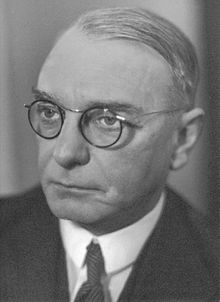Hugo Henkel
Hugo Wilhelm Henkel (born January 21, 1881 in Düsseldorf , † December 18, 1952 in Hösel ) was a German chemist and industrialist . He went down in history as the inventor of the detergent Persil .
Life
Hugo Henkel was born as the third and youngest son of the couple Fritz and Elisabeth Henkel, née von der Steinen. He studied chemistry in Stuttgart and Berlin and completed his studies in 1905 with a doctorate as Dr. phil. from. In Stuttgart he became a member of the Corps Stauffia Stuttgart. During his time in Berlin he was a fellow corps student at the Corps Saxonia-Berlin. From 1905 he took over the management of production in his father's company in Düsseldorf-Holthausen and from 1930 of the entire company, of which he had been a partner from 1908. He stayed in this position until 1938, after which, under pressure from the National Socialists, he moved to the newly established advisory board and supervisory board . During the time as the owner of the company, it took over a number of competing businesses. He played a key role in founding the first German whaling company mBH , initially in Bremerhaven and later with its headquarters on Ballindamm in Hamburg .
In 1914 he became a member of the Düsseldorf city council as a representative of the Liberal Association. On May 1, 1933, he joined the NSDAP ( membership number 2.266.961). From May 1934 to 1942 he was a member of the Düsseldorf City Council and from 1937 at the latest he was a member of the Supervisory Board of Deutsche Bank AG.
Since Hugo Henkel was one of the 42 industrialists on the war criminals list of the US Senate's special committee ( Kilgore Committee ), he was imprisoned in September 1945 and the company was placed under Allied control. In January 1947 he and his two sons Jost and Konrad were denazified. In this way they were able to regain their property and achieve that the dismantling in the years 1948 to 1950 was much smaller than previously planned. He began to rebuild the destroyed industrial facilities, which then resumed operations. He was committed to social and cultural issues. He was a member of the Düsseldorf Chamber of Commerce and Industry .
In memory of Hugo Henkel's wife Gerda, daughter Lisa Maskell founded the Gerda Henkel Foundation in 1976 , which is committed to promoting science - primarily history, archeology and art history. The seat of the foundation is still the neo-baroque town villa built by Hugo and Gerda Henkel in 1911 at Malkstenstraße 15.
family
Hugo Henkel married the daughter of the sculptor Karl Janssen , Gerda, on September 19, 1908 in Düsseldorf , from whose marriage the children Karl Jost (1909–1961), Gerda Ruth (* 1910), Elisabeth (1914–1998), later as Lisa Maskell known, Konrad (1915–1999) and Paul (1916–1942). Paul Henkel died in the war on July 27, 1942 in Voronezh , Russia.
A granddaughter of Hugo Henkel was the art collector and patron Anette Brandhorst , daughter of Hugo Henkel's daughter Elisabeth from her marriage to the architect Ernst Petersen .
Services
From 1905 he developed a scientifically based "method of hand washing", which was recognized at home and abroad. After taking over his parents' company, he introduced new forms of advertising based on market analysis .
Awards
In 1951 he received an honorary doctorate (Dr. med. Hc) from the Medical Academy of the University of Düsseldorf and honorary citizenship from the city of Düsseldorf . He was also made an honorary citizen of the University of Bonn that year and received the Normann Medal of the German Society for Fat Science for 1950 on October 9, 1951 .
See also
literature
- Kurt Eisermann: You hunted the whale in Antarctica. Germany's participation in whaling in the 20th century . In: Men from Morgenstern , Heimatbund an Elbe and Weser estuary e. V. (Ed.): Niederdeutsches Heimatblatt . No. 799 . Nordsee-Zeitung GmbH, Bremerhaven July 2016, p. 2–3 ( digitized version [PDF; 2.4 MB ; accessed on July 27, 2019]).
Web links
- Literature by and about Hugo Henkel in the catalog of the German National Library
Individual evidence
- ^ Carl Weigandt: History of the Corps Saxonia-Berlin to Aachen 1867-1967. Aachen 1968, p. 60.
- ↑ Chronicle 130 years of Henkel. (PDF) Henkel KGaA, September 25, 2006, accessed on August 21, 2016 .
- ↑ Annual Report for 1937 (PDF) Deutsche Bank , April 6, 1938, p. 5 , accessed on January 26, 2016 .
- ^ DGF Awards - Wilhelm Normann Medal. (No longer available online.) Archived from the original on November 30, 2010 ; accessed on March 26, 2009 (English, website of the German Society for Fat Science [DGF]). Info: The archive link was inserted automatically and has not yet been checked. Please check the original and archive link according to the instructions and then remove this notice.
- ^ Soaps, fats, oils, waxes. No. 22, 1951.
| personal data | |
|---|---|
| SURNAME | Henkel, Hugo |
| ALTERNATIVE NAMES | Henkel, Hugo Wilhelm (full name) |
| BRIEF DESCRIPTION | German industrialist |
| DATE OF BIRTH | January 21, 1881 |
| PLACE OF BIRTH | Dusseldorf |
| DATE OF DEATH | 18th December 1952 |
| Place of death | Hösel |
